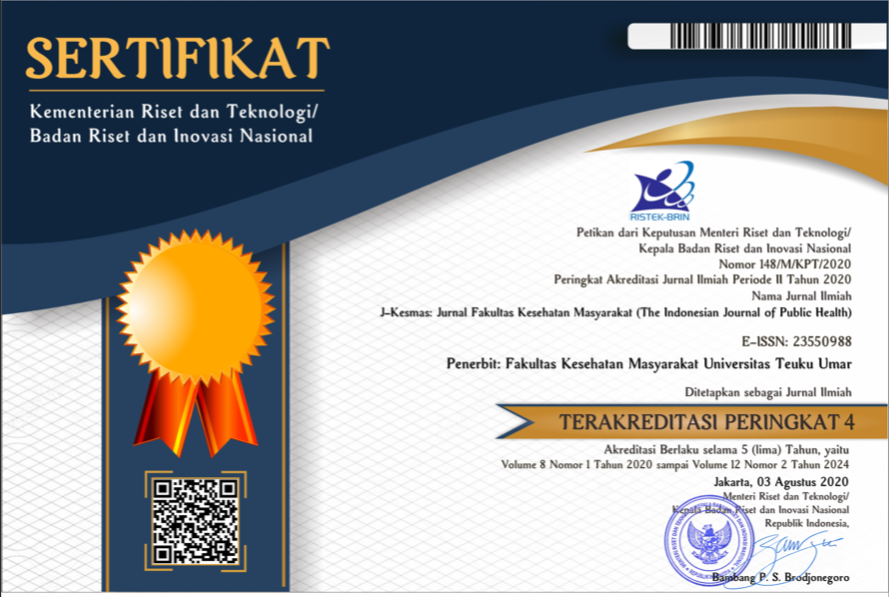The Design of the Role Model of Working Women (Occupational Health Perspective)
Abstract
Keywords
Full Text:
PDFReferences
Ahdiah, I. (2013) Peran-peran Perempuan dalam Masyarakat. Jurnal Academica, 05(02): 1085–1092.
Amran, Y. (2017) Peningkatan Peran Wanita Dalam Pengembangan Ilmu Kesehatan Masyarakat. Harkat, 12(2): 61–69.
BKKBN. (2018) Survei demografi dan Kesehatan Indonesia.
BPS. (2019) Keadaan Ketenagakerjaan Indonesia, Februari 2019 (Issue 41).
Donnelly, K., Twenge, J. M., Clark, M. A., Shaikh, S. K., Beiler-May, A., & Carter, N. T. (2016) Attitudes Toward Women’s Work and Family Roles in the United States, 1976–2013. Psychology of Women Quarterly, 40(1): 41–54.
Doss, C., & Sofa, T. (2011) The Role of Women in Agric. (Issue 11).
Hudson, R., & Julia. (2015) “Women Want to Work.” 27(2): 1939–1962.
Keefe, S. (2019) Women, Work, and (Re) Marriage: Entrepreneurship among Swahili Women in Coastal Tanzania. J. Africa Today, 62(3): 110–131.
Kemenkes. (2013) Gambaran Kesehatan Lanjut Usia di Indonesia. 1–40.
Lestari, Y. I. (2017) Fear of Success pada Perempuan Bekerja Ditinjau dari Konflik Peran Ganda dan Hardiness. J. Psikol., 13(1): 55–63.
Murtiana, T., & Hidayah, N. (2018) Kompleksitas Peran Wanita Pada Keluarga Dengan Pola Karir Ganda. Jurnal Pendidikan Sosiologi, 1–17.
Novita, R. (2018) Pengaruh Sindrome Menopouse terhadap Kualitas Hidup Wanita Pre Menopause Usia 40 Tahun Ke Atas di Puskesmas Medokan Ayu Kota Surabaya. Universitas Airlangga Surabaya.
Radhitya W, T. V. (2018) Peran Ganda yang Dialami Pekerja Wanita K3L. Jurnal Pekerja Sosial, 1(3), 204–219.
Siswanto (2010) Systematic Review Sebagai Metode Penelitian untuk Mensintesis Hasil-Hasil Penelitian (Sebuah Pengantar). Buletin Penelitian Sistem Kesehatan, 13(4): 326–333.
Smyth, R., Nielsen, I., Cheng, Z., & Wang, B. Z. (2018) The Paradox of The Contented Female Worker: The Mediating Role of Income and The Moderating Role of Sexual Orientation. International Journal of Human Resource Management, May: 1–23.
Sugiyono. (2017) Metode Penelitian Kuantitatif, Kualitatif. R & D Alfabeta.
Suma’mur. (2009) Hygiene Perusahaan dan Kesehatan Kerja (Hyperkes) (Reifmanto (ed.) Sagung Seto.
Susilo, R. (2019) KTT G20 di Osaka Jepang Ditutup Dengan Kesepakatan Peningkatan Peran Wanita. Tribunnews, 1.
Syarifudin, A. (2017) Peran Strategis Kaum Perempuan dalam Mewujudkan Masyarakat Religi. 12, 21–32.
Wahono, R. S. (2015) A Systematic Literature Riview of Software Defect Prediction: Research Trends, Datasets, Methods and Frameworks. J. of Software Engineering, 1(1).
DOI: https://doi.org/10.35308/j-kesmas.v7i1.1649
Refbacks
- There are currently no refbacks.
Managed by Fakultas Kesehatan Masyarakat
Published by Universitas Teuku Umar
Website: http://jurnal.utu.ac.id/jkesmas
Email: jkemas@utu.ac.id 
This work is licensed under a Creative Commons Attribution-ShareAlike 4.0 International License.







.jpg)


